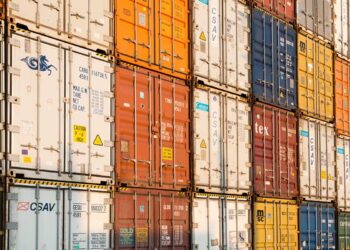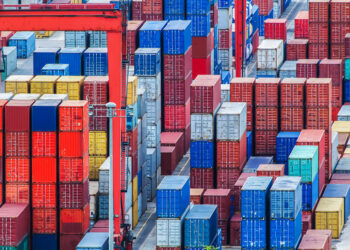The U.S. State Department on Dec. 7 published the text of a recent U.S.-Canada agreement covering the trade of recycled plastic between the two countries. The Canadian government published the agreement as well.
Signed by both countries in October, the agreement aims to maintain the countries’ plastic trade relationship in light of upcoming changes to global rules on scrap plastic shipments. The Basel Convention, a global treaty on waste shipments, will begin tighter scrutiny on scrap plastic shipments next year.
A coalition of environmental organizations expressed concern with the new U.S.-Canada agreement, and they are asking the Canadian government to adopt stricter control measures for scrap plastic trade with the U.S.
“In addition to the secretive manner in which the agreement was negotiated, we are concerned that in signing the agreement Canada will be in violation of its legal obligations under the Basel Convention when the Convention’s plastic wastes provisions come into effect on January 1, 2021,” the organizations wrote in a Dec. 2 letter.
The letter was signed by the Basel Action Network and RightOnCanada.ca on behalf of themselves and the International Pollutants Elimination Network (IPEN), the Center for International Environmental Law (CIEL), Friends of the Earth, HEJSupport, Environmental Investigation Agency, the Global Alliance for Incinerator Alternatives, the Plastic Pollution Coalition, The Last Beach Cleanup and the Surfrider Foundation.
Agreement maintains existing guidelines
Numerous countries will incorporate new Basel Convention rules on scrap plastic imports beginning in January. The rules generally increase oversight of scrap plastic shipments, by requiring exporters to provide notification and receive consent from importing countries before shipping scrap plastic.
Because the U.S. is not a party to the Basel Convention, exports to the 180-plus countries that are parties to the convention will be more complicated, or may even be prohibited by local laws. Experts are uncertain exactly how trade between the U.S. and party countries will be impacted.
With the new U.S.-Canada agreement, which is part of a wider Basel Convention trade arrangement between the two countries, the upcoming scrap plastic shipment restrictions would seemingly not cover most material moving across the U.S.-Canada border. Canada is the largest importer of U.S. scrap plastic.
The document references environmental and economic benefits from the global trade of recyclables. It also describes both countries’ “longstanding commitment to the environmentally sound management of waste and scrap, and their record of successful coordination and cooperation concerning the transboundary movement of waste and scrap,” according to the text.
Citing these and other factors, the agreement suggests trade of non-hazardous recyclables, which includes typical scrap plastic exports, will continue under their current guidelines. These include both countries having the capacity and intention to manage this material “in an environmentally sound manner,” whether it is recycled, disposed of or processed in another manner.
Groups take issue with deal
In their letter, the environmental advocacy organizations laid out several key concerns with the U.S.-Canada agreement.
They stated that, in order to meet Basel Convention rules on agreements between a party and non-party country, the U.S.-Canada agreement must include provisions that are “not less environmentally sound” than the terms of the Basel Convention. The letter makes the case that if the U.S.-Canada plastic trade continues as normal, it will be less environmentally sound than if it were subject to Basel Convention rules.
“We are deeply concerned that the Canada-United States Arrangement on export of plastic wastes, which Canada initiated and signed on October 26, 2020, thus does not comply with the Basel Convention and further sends a message to the world that Canada is willing to violate international law and wants the environmental trade rules they helped negotiate to apply to others but not to themselves or their trading partners,” the letter stated.
The environmental groups also expressed trepidation that the agreement could allow Canadian exporters to ship material to the U.S. and have it be exported from there without the Basel Convention controls. Canada’s environmental protection department, Environment and Climate Change Canada, wrote in a summary of the agreement that this type of trade would be “excluded from the Arrangement” between the two countries.
Environment and Climate Change Canada declined to comment to Plastics Recycling Update on the letter by press time. However, the department wrote that the U.S.-Canada pact is compatible with the terms of the Basel Convention.
“The principles of the Arrangement are based on the environmentally sound management of non-hazardous waste and scrap traded between Canada and the United States,” the department stated in its summary document. “The Arrangement affirms that Canada and the United States manage such waste in an environmentally sound manner, and intend to maintain measures to provide for the environmentally sound management of such waste and scrap in order to protect human health and the environment.”






















